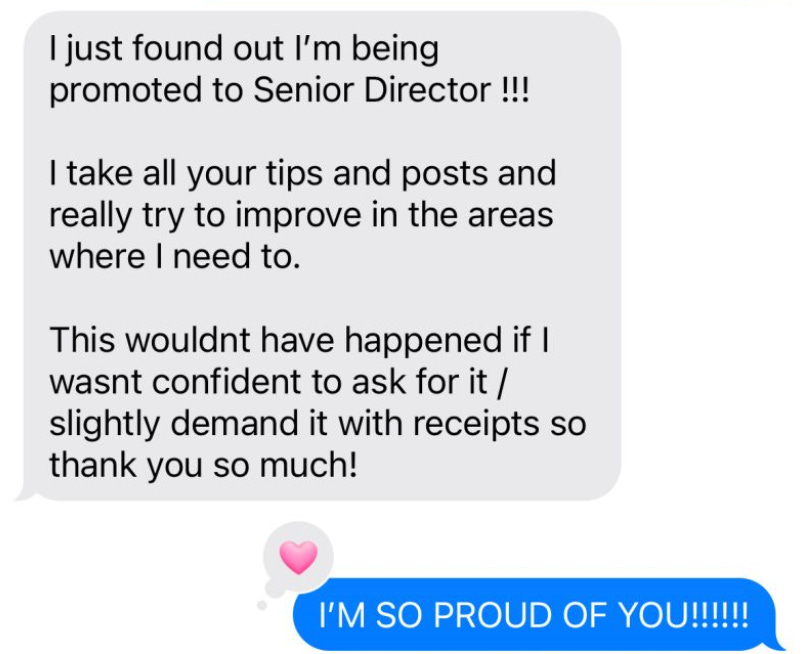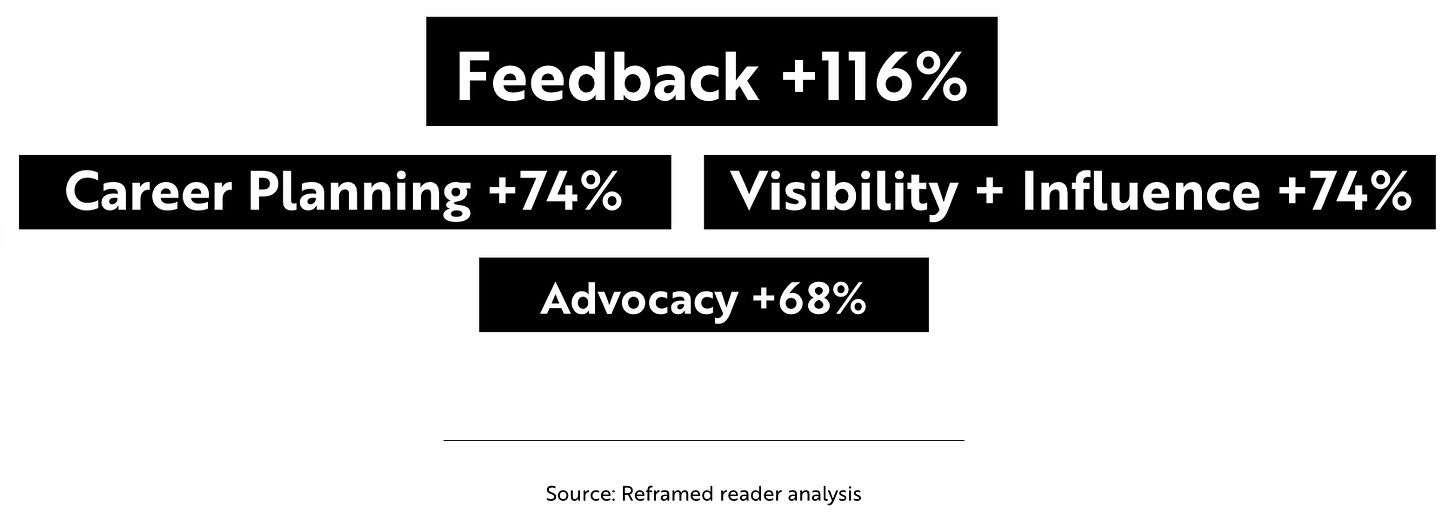Career Paths are Dead - Do This Instead
Part 2 of Work Insights Reframed — insights on how ambitious professionals are navigating work in 2025, drawn from thousands of data points, directly from high achievers.
Hi, I’m Ashley. Today’s newsletter is a continuation of last week’s — a snapshot of the culture of work in 2025. I’m giving you a deep dive look at who Reframed readers are, what work looks and feels like for high achievers, and what trends I’m seeing.
Last week, I published part one of my Reframed Insights Report. In case you missed it, I shared:
A look at who’s reading Reframed, spoiler alert: it’s probably your favorite leader
What career dissonance is and why it makes sense that so many people are feeling it
Why Swiss Army Knife Leadership is the dominant leadership style for high achievers in the workplace right now
In the previous edition, I wanted to zoom out and take a look at the culture of work as an observer, letting my coaching data, newsletter data, and external signals guide me. This week, I’m taking a more personal approach to my analysis. I’m grounding the final two trends more in my personal experiences with clients and readers to date. In it, you’ll find a description of the insight paired with some recommendations for you if the trend resonates.
Let’s dive into Part 2!
IN CASE YOU MISSED PART ONE →
INSIGHT 3
Career paths are dead.
There was a time when you could do good work, stay loyal, and watch the ladder appear rung by rung in front of you. The path to getting a raise or a promotion felt much more clear. Earning a raise or promotion came with responsibilities and benefits that were actually appealing. That ladder doesn’t exist anymore.
If you’re reading Reframed, you’re likely doing great work. You’re trusted. You’re even influencing decision making. But the “next level” you assumed would come? It might feel blurry. So you start asking:
Why am I working this hard for the same role, same title, and the same paycheck?
Do I even want the obvious “next step”?
What do I even want out of my career?
Some people choose to opt out of corporate entirely. Others keep grinding, hoping the right next step appears. Others start writing their own rules entirely.
The Vibe
I have this really annoying habit where I hate doing the thing that everyone else is doing lol. I was done with the traditional notion of career pathing about 8-10 years ago. I’ve written about the one conversation that changed my career in a previous newsletter; it was the catalyst that made me think critically about what I wanted out of my career. It’s why I went from IC > Manager > Director > Senior Director > VP in a 5 year timeline.
I created a strategic framework that worked for me.
That’s the energy today’s career landscape demands: decisiveness about what you want and the guts to go after it. The key isn’t chasing every new trend either. Conversations around freelancing, fractional leadership, and portfolio careers are hot right now. That doesn’t have to be your path, but you do have to get clear on what you want.
Right now most of my clients aren’t asking “Am I ready to grow?” they’re asking, “What’s the right next step for me?” The answer to that question is the key to creating a career you want.
Signals
Here’s some signals that prove to me that more people are either seeking answers to or will be seeking answers to “What’s the right next step for me?”:
External signals: Rates of promotion into management have fallen across nearly all age groups. The challenge for companies is how to find ways to create growth opportunities even if that doesn’t mean a substantial pay raise or a title change. CEOs are reluctant to add roles or create layers of additional middle managers within organizations. (People Are Feeling Stuck In Their Jobs - WSJ)
Audience signals: my coaching consultation forms reveal that folks are craving more clarity about their direction:
“I don’t want my job to be my entire identity anymore. Do I want to be a founder, a creative, a consultant — or all of the above?”
“I’m doing the work, but my title doesn’t reflect it.”
“I’m not sure managing people is even what I want — but what’s the alternative if I want to make more money?”
Clarity is the difference between staying stuck and defining the career you actually want.
If This Resonates, Try This →
In my work, when high achievers don’t have clarity, they end up spinning their wheels. They stay in roles that keep them busy but not fulfilled or they leap into their next opportunity (sometimes out of frustration!) without pausing to ask if it truly fits.
The danger isn’t just “being stuck”, it’s burning your best energy on work that doesn’t feel like it’s building toward anything.
When my clients are stuck, I take them through my REF (Reflect-Explore-Find) method. After we work through it, they go on to feel confident about their roles, explore new paths, find new jobs, get promoted — you name it. But most importantly, they move past feeling “stuck”. Here’s two of the questions we use, reflect on them if you’re feeling stuck and see where your answers take you.
Motivations: List the work activities that give you energy. Then list the ones that drain you.
Strengths: Which skills would your colleagues say you’re unmistakably good at? Which strengths earned you your last two roles?
See if you notice any patterns. Does anything surprise you?
Finding clarity is the difference between staying stuck and defining the career you actually want.
INSIGHT 4
Pep talks are out, playbooks are in.
I consistently hear how helpful it is for my clients to have a coach that personally understands their experience. I also hear from readers how nice and affirming it is to read a newsletter that feels like it speaks to their experience. People are tired of “AI slop” and LinkedIn “thought leadership” that doesn’t feel applicable. What they’re craving is advice that feels real, something that reflects their actual experience at work and gives them tools they can use right away.
The Vibe
When I think about my own career and my work with clients, I’ve noticed a major shift: people don’t just want frameworks handed down from on high. Platitudes are like scribbling affirmations on a Post-it. They might give you a temporary boost, but nothing changes unless you take the right action steps.
When you see someone land a promotion, a stretch role, or that next big opportunity, it’s not random. They asked the right people the right questions and then they took action. Step by step, consistently.
That’s why tactical posts like “10 Non-Cringey Ways to Promote Yourself” and “9 Low-Lift Ways to Stay Top of Mind at Work” are two of my most-read newsletters.
Signals I’m Seeing
My newsletter engagement data shows tactical posts consistently outperform abstract ones — both in open rates and their ongoing relevance.
This LinkedIn post about a friend reading my newsletter and getting promoted to Senior Director was my top performing post this year. I’ve gotten posts with way more likes, but this one hit 45k+ impressions and generated 200 newsletter subscribers.
If This Resonates, Try This →
The era of platitudes is over. Platitudes won’t get you promoted, they won’t land you a new job, and they won’t help you become a better leader. What works is real advice from people who’ve been where you are — navigating tough bosses, stepping into leadership, figuring out when to stay and when to walk. If you’re looking for actionable career advice, Reframed is it :)
Start here:
This One Small Tweak Will Get You the AI Advice You Actually Need
I Asked 7 Seasoned Leaders How They Got Better at Self-Promotion
And because you read this far, here are some of my favorite writers who share actionable insights:
Wes Kao’s newsletter - tactical advice that helps you work and lead better, Wes’s style is direct and unfiltered
The OffBeat Lead Sheet - Allison does a weekly round up of really great practical leadership guides and tips
The Caring Techie - Irina’s newsletter has “techie” in the title but I’ve found that the advice is broadly applicable to anyone looking to up level their leadership
Working Theorys - I really enjoy Anu’s essays, not because they tell me what to do but because I’ve found that reflection is an incredibly helpful part of taking action. She pushes me to broaden my thinking in ways that open me up to think more creatively about my work.
CONCLUSION
As I was writing this, the throughline between both insights felt so clear: clarity and action separate those who advance from those who stay stuck. Conventional wisdom may encourage you that you have to follow societal standards. But, the key to figuring out your next step is uncovering what drives you.
The current culture of work is pushing an ambitious subset to question the norm and rethink traditional paths. And as a result, many of you will push yourselves beyond the limits of what we thought was possible. It doesn’t come without challenges or friction, but I personally think it’s exciting.
You don’t need a perfectly mapped-out career path — they don’t really exist anymore. What you need is a clearer sense of what you want and the nerve to act on advice that actually works.
Good luck.
Quick note: I’ll be publishing less frequently over the next month while some very exciting life things are happening. See you soon!
Ashley
One more thing, subscribe to Reframed.
Not subscribed yet? I share fresh leadership and career insights every Monday at 8AM, right before you tackle your week.
If you’re curious, people who work at the following companies subscribe to Reframed. Join readers from Netflix, Google, Uber, Chanel, LinkedIn, and Sephora each week.






This was really great and affirming! I feel the shift too! People are really over platitudes and are looking for real and actionable advice. I decided to re-release my book in the business of photography in a few weeks for this very reason!